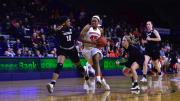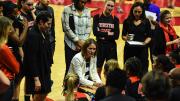As the Princeton men’s basketball team pulled away from Penn in overtime of the Ivy League tournament semifinals last March, a Tigers supporter paced just outside the team’s locker room, loudly willing the clock down to zero
“Tick. Tick. Tick. Tick.”
His angst was a microcosm of the excitement swelling through the Palestra that afternoon. A reported 6,209 fans were in attendance, leaving only a small number of seats unfilled in the “Cathedral of College Basketball.” Chants of “Defense!” ricocheted across the gym, and the game was broadcast nationally on ESPNU. As Penn coach Steve Donahue told NBC Sports, “This felt like an NCAA tournament environment.”
Roughly five hours later, as the Harvard and Princeton women’s basketball teams finished the second women’s semifinal, the atmosphere was different. The crowd had dissipated. (A single ticket admitted fans to all four games, and the Ivy League reported the same attendance for each, but video of that women’s match showed many empty seats, especially in the upper sections.) There were a few coordinated chants, but mostly the isolated cries of individual fans stood out. The game was shown live only on ESPN3, an online portal, and replayed later on ESPNU.
The lopsided score may have shifted the mood (Princeton won 68-47 and led comfortably throughout the second half), and the first men’s semifinal had featured storied rivals, one at home. But the league’s women’s coaches saw another major culprit for the dampened attendance and excitement: scheduling. The women’s semifinals—which tipped off at 11 a.m. and shortly before 7 p.m.—had been sandwiched around the two men’s games. “We felt like they sprinkled in some women’s basketball in a men’s basketball tournament,” said Yale head coach Allison Guth. “That’s how we felt last year.”
“That couldn’t be further from the truth,” responded Ivy League executive director Robin Harris, when asked about this sentiment. An Ivy League working group, she said, with representatives from all eight schools, collaborates with the league and athletic directors to meet men’s and women’s basketball interests. The league, she said, had scheduled one women’s semifinal before the men’s semifinals—whose timing reflected television availability—to avoid making the women’s games too late. “We did that,” Harris emphasized, “to benefit the women.”
Yet one year later, the coaches’ discontent has lingered, if not intensified. And it reflects difficult negotiations about this year’s game times, decades of frustration, and broader questions about how the tournament is balancing social, athletic, and commercial objectives. In the context of the league’s aspiration to make its sports programs not only genuinely beneficial for student-athletes, but also representative of the schools’ larger social values, this is a serious conflict.
Last year, the Ivy League celebrated—and heavily marketed—“the inaugural Ivy League men’s and women’s basketball tournaments.” Technically, this was true: the conference had never had a combined men’s and women’s tournament to determine who would receive the league’s automatic NCAA tournament berth. But the billing obscured the fact that there had been nine previous Ivy League basketball tournaments, all among women’s squads. Eight were played from 1975 to 1982, when the teams participated in the Association for Intercollegiate Athletics for Women; another occurred in 1986, after Ivy League basketball joined the NCAA.
The lack of recognition for this history did not sit well with former players and coaches. At last year’s tournament, one alumna confronted Harris to say, “You treat women like shit,” and “I’m so disappointed.” Chris Wielgus, who won 12 Ivy League championships as Dartmouth’s coach from 1976 to 1984 and 1993 to 2013, made a similar point. “There were times when I laughed when they said, ‘This is the first Ivy League tournament,’” she said, in an interview. “‘No, well, excuse me, we’ve had several.’” Added Wielgus, who will be honored as a Legend of Ivy League basketball at this year’s tournament: “It wasn’t for real until the men had decided to participate.”
According to Harris, the previous women’s basketball tournaments were detailed in the event program, but because they had no post-season implications, the league distinguished between them and the modern format, which determines NCAA bids. There also was marketing to consider. Harris—who mentioned constructive email and in-person discussions with alumnae and coaches who expressed concern—said that it was difficult to find language that combined “the inaugural men’s [tournament]” and the “sort-of-the-inaugural women’s [tournament] in the modern era.” She pointed out that tournament marketing is integral to the season-long effort to promote women’s basketball. “We are constantly striking a balance between our current success and our tradition,” Harris said, “and we tried to do that last year, and if some people didn’t like how we did that, I’m sorry, but we did it with the best of intentions.”
Still, the coaches’ frustration transcends semantics. According to Wielgus and Harvard head coach Kathy Delaney-Smith, now in her thirty-sixth year, the women’s coaches pushed for a conference tournament for much of the past 30 years but, until recently, encountered resistance. Some schools, Wielgus said, were wary of being tainted by the commercial sponsorship that would be required to finance a tournament. (The presenting partner of last year’s tournament was Citizens Bank; Porsche joined as a sponsor this year.) More important, though, was the fact that the men’s teams did not want a tournament. “We just got the door slammed on us,” said Delaney-Smith. “No tournament, no tournament, no tournament, because only the women wanted it. The men didn’t.”
That sentiment has shifted during the last decade, in part because of a change in the competitive landscape on the men’s side. From 1959 to 2007, Penn and Princeton won 50 conference championships. The rest of the league was often weak. A tournament risked a weaker team representing the Ivies in the NCAAs, and some felt that Penn and Princeton were trying to protect their existing advantage. From 2008 to 2010, Cornell captured three conference titles, Harvard won five championships from 2011 through 2015, and Yale claimed a pair of crowns as well. After the Penn-Princeton stranglehold loosened, the men were open to a tournament.
Other factors added support. Turnover removed athletic directors who had opposed it, plus there was the league’s recent success in the NCAA tournament, the support of student-athletes, the exciting Harvard-Yale playoff at the Palestra in 2015, and the conference’s interest in becoming a bigger part of (and increasing its exposure during) March Madness. A March 2016 press release announced the establishment of the Ivy League tournament. Harris said in a November 2016 interview, “It just was an idea whose time had come.”
Even after the tournament announcement was made, though, numerous questions remained, including the game schedule. Ultimately, the preferences of broadcast partner ESPN prevailed. (Last year, the league reached its agreement with ESPN late in the network’s scheduling process, which limited flexibility, Harris explained.) The women’s coaches expressed some unease about the schedule; but there was enormous excitement in general about the tournament, as well as about the broader recognition that it was finally happening.
The actual experience of the 2017 tournament, though—the late and early game slots, the small crowd—shifted the women’s perspective and heightened their concerns, which the coaches shared with league officials during an April 2017 meeting. According to one attendee, Delaney-Smith suggested that the women’s teams were being treated like “second-class citizens.” The group also discussed the tournament’s location (including Penn’s advantage from hosting), the reasons the event was established, the extent to which revenue was a priority, and whether the Ivy League had studied how other conferences structure their conference tournaments to balance these objectives.
The latter point matters because many leagues do not play the men’s and women’s tournaments in the same location; this mitigates scheduling challenges. According to Harris, there has been enthusiasm in the Ivy League—including among member schools’ presidents—to play all the games in a single arena. A working group of select men’s and women’s coaches and athletic directors studied different tournament format, and the thinking, Harris said, was that this would contribute to “amazing synergy around March Madness.” And to her eye, this indeed happened last year: fans and administrators from schools whose men’s and women’s teams qualified attended both competitions, and journalists covered both tournaments. She also said that sticking to a single location facilitated efforts to get ESPN to cover all six games. “It really was a wonderful opportunity,” she said, “to unify Ivy League basketball at a critical time in the season.”
One of the biggest questions at the April 2017 meeting was whether the women’s semifinals would be played back-to-back, as opposed to bookending the men’s semifinals. The coaches supported that change, believing it would make it easier for fans to attend both women’s games.
Shortly thereafter, the coaches received an email from an official in the Ivy League office, which had been working with ESPN to explore scheduling, informing them that the options were 7 p.m. and 9:30 p.m.—or 7 a.m. and 9:30 a.m. That email, Harris said, came from an official who “cares passionately about women’s basketball…[and] has spent her whole career fighting for and supporting women’s sports, including and particularly women’s basketball, and who was laying out the full range of scenarios so [the coaches] would understand what back-to-back games meant if they wanted that.” She added, “The point of the communication was to get [the coaches’] feedback.”
Still, it caught them off guard. According to Princeton head coach Courtney Banghart, who chairs the meetings of the Ivy women’s basketball coaches, the early morning tipoff “really felt insulting,” whereas the 9:30 p.m. tipoff risked replicating the deserted arena of the previous year. “It sounds like at that point,” Banghart said, “we’re basically saying, ‘We have a men’s tournament, and [there] also happen to be women running around after.” (Harris noted that the later times are common in other conference tournaments, particularly on the men’s side.) More broadly, there was a sense that the coaches’ concerns weren’t being heard. Delaney-Smith said, “Every coach of a woman’s team, including me, is very, very, very upset and disappointed with the game times that were offered to us after we thought we had expressed concerns with last year’s times.”
The coaches then held a conference call so they could “present a unified stance,” in Banghart’s words. League officials asked to participate, but the coaches declined. As Banghart put it, the coaches would “feel more comfortable” speaking as a group.
She then followed up with an email and phone call to Ivy officials in which she and her colleagues shared their disappointments and hopes. The league responded with a more detailed explanation of the factors affecting the game times. These factors, as Harris explained in an interview, include missed class time, the NCAA tournament selection committees’ timetables (the men’s bracket is unveiled on Sunday at 6 p.m. and the women’s bracket on Monday at 7 p.m.), fan and coach preferences, and television slots.
Ultimately, the coaches and league brokered a compromise in which the first women’s semifinal would tipoff at 6:00 p.m. and the second would start 30 minutes after the first game concluded. This required shortening the teams’ warmups, an acceptable tradeoff to the coaches. Harris believes the dialogue began with an unfortunate misunderstanding but led to a better place. “When we can as a league come together and have honest conversation and put the issues and concerns on the table,” she said, “we come up with great solutions.” The coaches were pleased by their own efforts: “If it wasn’t for the shared voice and the collective voice of our women’s coaches,” said Banghart, “it would have been 7:00 p.m. and 9:30 p.m.”
All eight Ivy League women’s basketball coaches spoke to Harvard Magazine for this article. All concurred that the game times presented a challenge, although they differed in their intensity of feeling and their thoughts on the most important priority moving forward.
Penn coach Mike McLaughlin focused on making the most of this year’s event. “I still think we can put together a phenomenal tournament with eight great teams out there,” he said.
Brown’s Sarah Behn said she is grateful to have a tournament, as did Yale’s Guth. Cornell’s Dayna Smith emphasized the tournament’s value: it showcases the conference’s strength. The Ivy League women have the ninth-best RPI of 32 conferences nationally. (The RPI—or Ratings Percentage Index—ranks teams and leagues based on their win-loss records and strength of schedule.) Said Smith, the league’s second-longest tenured head coach, “For us to be able to have a tournament and have that national stage…just changes the face of what our league is and what it can be.”
Others put the scheduling question in the context of a larger debate about the tournament. Columbia coach Megan Griffith advocated expanding the field to all 16 men’s and women’s teams (currently, only the top four men’s and women’s teams qualify), though, she noted, this might interfere with playing the tournaments together in one building.
Princeton’s Banghart questioned playing the event at the Palestra, Penn’s home court. To her, this institutionalizes a Quaker home-court advantage that exacerbates the risk that the league does not send its best team to the NCAA tournament. She also argues that this points to a bigger question as the league tries to balance different priorities (national exposure, competitive balance, equity, the student-athlete experience, and marketing). If the league is going to risk a championship upset that might send a weaker team to the NCAA tournament, what gains is it seeking in return?
Several coaches emphasized the broader social context of the Ivy tournament and its thorny complications. Dartmouth coach Belle Koclanes said, “I always say this to my team: ‘Do the best you can with the time you have.’ My role [is] not just to earn championships. It’s to advocate for my young women and advocate what is right in the world and what is right in society, and that’s equity, and we’re not there yet.” Delaney-Smith added, “I understand that the world operates on productivity, but at what point are we going to work to rid the world of gender bias?”
“The bottom line,” she said, “is, we’re starting at second-class citizen status.”
From the perspective of those citizens, the student-athletes, the jury is out. Griffith, who played for Columbia and graduated in 2007, said that while it is important for coaches to weigh scheduling, her mentality as a player would be, “Let’s go. We gotta compete.” Another former Ivy women’s basketball player who participated in the NCAA tournament described the turnaround time for the second women’s semifinal winner (roughly one hour shorter than that of their male counterparts) as “crazy,” noting that one plays extra hard in a playoff.
Amid this complex discussion, the Ivy League tournament tips off on Saturday in Philadelphia.










